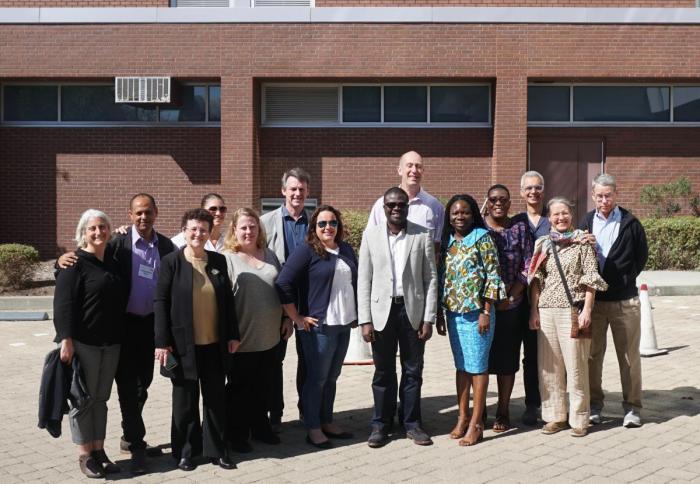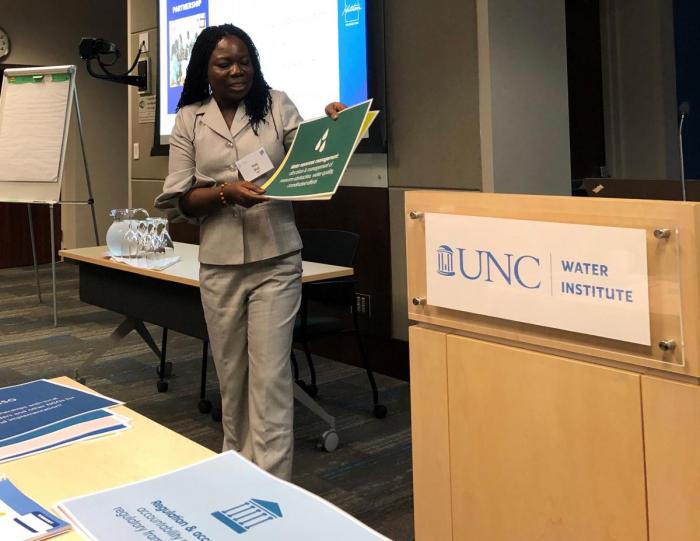Where science meets policy, and practice.
Published on: 31/10/2019
We like the UNC Water and Health Conference for its focus on policy but also practice. It goes out of its way to make space for voices from the grassroots and that's why IRC goes in force (and because we have a management retreat in parallel with the conference). WASH systems was again one of the prominent themes at the conference – they have to be central if we are to achieve the SDGs as recognised in the recent GLAAS report - and we aimed to share lessons from our experiences to date in trying to strengthen WASH systems.
Mostly, we were proud to see colleagues from IRC Burkina Faso, Ethiopia, Ghana and Uganda leading the planning and delivery of side-sessions, being invited as panelists and giving presentations in sessions convened by WASH sector partners. Here, we are sharing some highlights of the moments where the IRC family took the stage to engage others in what we are passionate about.

The first session on Monday morning was convened by the Conrad N. Hilton Foundation, IRC and the Millennium Water Alliance (MWA) and facilitated by IRC Ghana Country Director, Vida Duti shared experiences from the six countries where master plans are being implemented. More about the programme here. We had a packed room of about 80-100 participants.
Andrea Jones, Program Officer at the Conrad N. Hilton Foundation set the scene by describing a partnership framework developed by the Stanford Woods Institute. She shared how the Foundation sees collective action as a key driver for systems change.
Come learn about monitoring @NabunnyaJane #WASHsystems #uncwaterandhealth pic.twitter.com/qf1bpuLZOR
— Susan Davis (@SusanDavisWASH) October 7, 2019
This was followed by 1-minute pitches – see one from IRC Uganda's Jane Nabunnya in the short video above - and table discussions facilitated by IRC country directors, WASH experts and MWA about strengthening WASH system building blocks at the district level.

Cases of how our Uganda team does monitoring in Kabarole, how a costing study is supporting financing the master plan in Asutifi North, Ghana or how MWA developed position papers with partners in Ethiopia were shared. These sparked interesting conversations about collective action, its application within the different countries, and related opportunities and challenges. People asked questions about how to use the master plans better for advocacy purposes, how data from master plan monitoring can better inform decision-making at national level or how NGOs can make commitments until 2030 while working in 3 to 5-year project cycles. The interest and great conversations only emphasised that sharing the how of WASH systems strengthening will have to continue to be a central theme for learning.
Another highlight was a side event hosted by IRC Ghana on how together with the Asutifi North District and Netcentric Campaigns professionalised customer support was introduced in the district to increase quality, accountability, collaborative practice, and mobilise popular support for WASH.
The initiative aims to break the cycle of 'fix, neglect and fail' which has characterized WASH services, by building a network of citizens. It thrives on the premise that regular communications and engagements will connect people into a movement, powerful enough to drive and sustain WASH services, and thus, improved customer experience.
The session engaged an audience panel where people shared their own positive or negative stories about engaging with customer service desks and made suggestions for further professionalising the ANAM WASHdesk initiative. A great response to all this was the reaction of Isaac Agyapong, District Chief Executive of another district in Ghana, the Kwahu East District Assembly. After hearing about this initiative for the first time, he announced that his district may think about replicating the process.
How can research and learning institutions contribute to national sector processes? Deep in discussion at #uncwaterandhealth with current - and we hope future! - members of @sanwatforall research and learning constituency pic.twitter.com/feKfX1PBvf
— Patrick Moriarty (@ircpatrick) October 8, 2019
Sharing stories from our country programmes and focus districts was one of the main drivers of IRC's presence at the conference. Going towards a more global angle, it was good to see Sanitation and Water for All (SWA) also taking centre stage. The Research and Learning (R&L) Constituency of SWA coordinated various activities to raise the profile of R&L in contribution to the WASH sector.
The events discussed good practices as well as bottlenecks and lessons learned on effective engagement of R&L institutions in national sector processes. Encouraging government counterparts to forge longer-term partnerships and crafting the research agenda and questions together with the stakeholders were some of the recommendations resulting from the discussions on R&L's role in influencing WASH decision making. At the same time the events highlighted the value of the SWA partnership in the following:
There are many more moments where IRC colleagues shared lessons learned from district and national level activities below. Browse through them by checking out some of our favourite tweets of the week.
"Don't exit, transform" - check out another contribution of IRC Ghana Country Director, Vida Duti to a panel discussion on exit strategies below.
@IRCWASH Ghana Country Director @dutiv reminds us to focus on the people behind our various #WASHsystems building blocks and frameworks. Bravo! #uncwaterandhealth pic.twitter.com/ag0oo7mwcj
— Alec Shannon (@alecshanno) October 8, 2019
Jane Nabunnya, IRC Uganda Country Director presented on how working on national advocacy is key for improving menstrual hygiene management policies in Uganda.
@UNC_Water_Inst #uncwaterandhealth we are now talking #MHM menstrual hygiene management. @NabunnyaJane talking about the role of govt @IRCWASH @WSSCCouncil https://t.co/xLTsQKS40O
— Lydia Mirembe (@lydmirembe) October 7, 2019
Lydia Mirembe of IRC Uganda shared experiences with a campaign for improving access to sanitation in Kabarole district. At the heart of the presentation was the case of Kijura Town Council, where exemplary leadership transformed the process of improving sanitation at the household level.
@lydmirembe presents on her and her team's exemplary leadership approach to improving sanitation and safe water access in Uganda. Great job! @IRCWASH #WASHagenda #uncwaterandhealth pic.twitter.com/qgQzzEVWnH
— Strong WASH Systems (@WASHstrong) October 10, 2019
Watch a video of the campaign here:
Ingeborg Krukkert presented on capacity building for improved WASH governance through tracking budgets in India.
Money earmarked for sanitation in India is not utilized accurately, leading to a "vicious cycle for laggard states." So impressive to see this financial data! @IRCWASH #uncwaterandhealth #WASHsystems #WASHagenda
— Strong WASH Systems (@WASHstrong) October 9, 2019
IRC Ghana held a side session on their experiences with using prize mechanisms to tackle the sanitation challenge in Ghana. Find more information about the Sanitation Challenge for Ghana here.
We also joined WaterAid, Water For People and Conservation International for a session on climate change adaptation. Highlights include IRC Ethiopia's Lemessa Mekonta sharing experiences on making WASH services resilient in arid lowlands in Ethiopia. "Whether your lens is WASH, IWRM, water security, climate ... it's the same message. Strong systems are resilient: weak ones aren't."
Might be my favorite panel of the week. Favorite orgs, friends, topic AND most importantly strong balance gender, north/south, language diversity. See? Not so hard. #inclusivepanels @waterforpeople @IRCWASH @WaterAidAmerica @ConservationOrg pic.twitter.com/DdYzGVPMIH
— Kimberly S. Lemme (@kimberlyslemme) October 10, 2019
Stepping outside of the conference room, we also participated in a great WASH Systems Reception co-hosted by Agenda for Change and the Millennium Water Alliance. Eleanor Allen, CEO of Water For People, announced the addition of four new Agenda for Change members: Catholic Relief Services, The Center for Water Security and Cooperation, Helvetas, and WaterSHED. And we also played a round of blunders, bloopers and foul-ups facilitated by Dani Barrington.
Great vibes, games and #WASHsystems talks at the #AgendaForChange reception! #uncwaterandhealth @SusanDavisWASH @MWAWater pic.twitter.com/huW4uOvsv3
— ircwash (@IRCWASH) October 8, 2019
And the list does not end here. We returned from UNC exhausted but happy to have had so many opportunities to share, to learn from others and to be inspired. See you there next year?
At IRC we have strong opinions and we value honest and frank discussion, so you won't be surprised to hear that not all the opinions on this site represent our official policy.